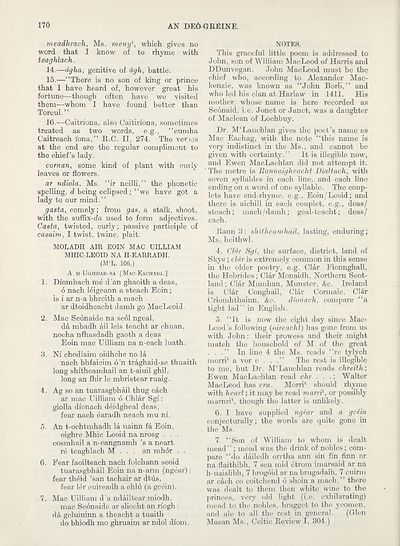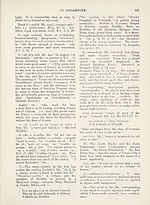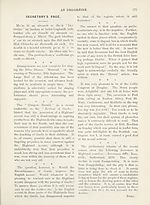An Comunn Gàidhealach Publications > Deo-gréine > Volume 16, October 1920-September 1921
(178) Page 170
Download files
Complete book:
Individual page:
Thumbnail gallery: Grid view | List view

170
AN DEO-GRtilNE.
rneadhrach, Ms. meny1, which gives no
word that I know of to rhyme with
teaghlach.
14. —dgha, genitive of dgh, battle.
15. —“There is no son of king or prince
that I have heard of, however great his
fortune—though often have we visited
them—whom I have found better than
Torcul. ’’
16. —Caitriona, also Caitiriona, sometimes
treated as two words, e.g., “cumha
Caitreach iona,’’ R.C. II, 274. The verges
at the end are the regular compliment to
the chief’s lady.
cornan, some kind of plant with curly
leaves or flowers.
ar ndiola, Ms. “ir neilli,’’ the phonetic
spelling, d being eclipsed; “we have got a
lady to our mind.’’
gasta, comely; from gas, a stalk, shoot,
with the suffix-da used to form adjectives.
Casta, twisted, curly; passive participle of
casaim, I twist, twine, plait.
MOLADH AIR EOIN MAC UILLIAM
MHIC-LEOID NA H-EARRADH.
(M‘L. 106.)
A h-Ughdar-sa [Mac-Eachaig. ]
1. Diombach me d’an ghaoith a deas,
6 nach leigeann a steach Eoin;
is i ar n-a bhreith a mach
ar dtoidheacht damh go MacLeoid.
2. Mac Seonaide na seol ngeal,
da mbadh ail leis teacht ar chuan,
nocha nfhasdadh gaoth a deas
Eoin mac Uilliam na n-each luath.
3. Ni chodlaim oidhche no la
nach bhfaicim 6’n traghaid-se thuaith
long shitheamhail an t-siuil ghil,
long an fhir le mbristear ruaig.
4. Ag so an tuarasgbhail thug c&ch
ar mac Uilliam 6 Chl&r Sgi:
giolla dionach deidgheal deas,
fear nach daradh neach mu ni.
5. An t-ochtmhadh la uainn f& Eoin,
oighre Mhic Leoid na nrosg . . .
cosmhail a n-eangnamh’s a neart
re teaghlach M . . . an mh6r . .
6. Fear faoilteach nach folchann seoid
tuarasgbhail Eoin na n-arm (ngear):
fear th&d ’san tachair ar dtiis,
fear ler cuireadh a chid (a gcein).
7. Mac Uilliam d’a nd&iltear miodh,
mac Sebnaide ar sliocht an riogh :
d& gcluininn a theacht a tuaith
do bhiodh mo ghruaim ar ndol diom.
NOTES.
This graceful little poem is addressed to
John, son of William MacLeod of Harris and
DDunvegan. John MacLeod must be the
chief who, according to Alexander Mac¬
kenzie, was known as “John Borb,’’ and
who led his clan at Harlaw in 1411. His
mother, whose name is here recorded as
Seonaid, i.e. Jonet or Janet, was a daughter
of Maclean of Lochbuy.
Hr. M'Lauchlan gives the poet’s name as
Mac Eachag, with the note “this name is
very indistinct in the Ms., and cannot be
given with certainty.’’ It is illegible now,
and Ewen MacLachlan did not attempt it.
' The metre is Rannaigheacht Dialtach, with
seven syllables in each line,, and each line
ending on a word of one syllable. The coup¬
lets have end-rhyme, e.g., Eoin/Leoid; and
there is aichill in each couplet, e.g., deas/
steach; mach/damh; geal-teacht; deas/
each.
Rann 3 : shitheamhail, lasting, enduring;
Ms. heithwl.
4. Cldr Sgi, the surface, district, land of
Skye; cldr is extremely common in this sense
in the older poetry, e.g. Cldr Fionnghall,
the Hebrides; Clar Monaidh, Northern Scot¬
land; Cldr Mumhan, Munster, &c. Ireland
is Cldr Conghail, Cldr Cormaic, Clar
Criomhthainn, &c. dionach, compare “a
tight lad” in English.
5. “It is now the eight day since Mac¬
Leod’s following (oireacht) has gone from us
with John: their prowess and their might
match the household of M. of the great
...” In line 4 the Ms. reads “re tylych
morri* a vor c . . .” The rest is illegible
to me, but Dr. M'Lauchlan reads chreith;
Ewen MacLachlan read chr . . .; Walter
MacLeod has cru. Morrb should rhyme
with heart; it may be read marri1, or possibly
marnri*, though the latter is unlikely.
6. I have supplied ngear and a gcein
conjecturally; the words are quite gone in
the Ms.
7. “Son of William to whom is dealt
mead ’ ’; mead was the drink of nobles; com¬
pare “do ddiledh orrtha ann sin fin Ann ar
na flaithibh, 7 sen mid etrom imarsaid ar na
h-uaislibh, 7 brogbid ar na brugadaib, 7 cuirm
ar cdch co coitchend b shoin a mach, ” there
was dealt to them then white wine to the
princes, very old light (i.e. exhilarating)
mead to the nobles, bragget to the yeomen,
and ale to all the rest in general. (Glen
Masan Ms., Celtic Review I, 304.)
AN DEO-GRtilNE.
rneadhrach, Ms. meny1, which gives no
word that I know of to rhyme with
teaghlach.
14. —dgha, genitive of dgh, battle.
15. —“There is no son of king or prince
that I have heard of, however great his
fortune—though often have we visited
them—whom I have found better than
Torcul. ’’
16. —Caitriona, also Caitiriona, sometimes
treated as two words, e.g., “cumha
Caitreach iona,’’ R.C. II, 274. The verges
at the end are the regular compliment to
the chief’s lady.
cornan, some kind of plant with curly
leaves or flowers.
ar ndiola, Ms. “ir neilli,’’ the phonetic
spelling, d being eclipsed; “we have got a
lady to our mind.’’
gasta, comely; from gas, a stalk, shoot,
with the suffix-da used to form adjectives.
Casta, twisted, curly; passive participle of
casaim, I twist, twine, plait.
MOLADH AIR EOIN MAC UILLIAM
MHIC-LEOID NA H-EARRADH.
(M‘L. 106.)
A h-Ughdar-sa [Mac-Eachaig. ]
1. Diombach me d’an ghaoith a deas,
6 nach leigeann a steach Eoin;
is i ar n-a bhreith a mach
ar dtoidheacht damh go MacLeoid.
2. Mac Seonaide na seol ngeal,
da mbadh ail leis teacht ar chuan,
nocha nfhasdadh gaoth a deas
Eoin mac Uilliam na n-each luath.
3. Ni chodlaim oidhche no la
nach bhfaicim 6’n traghaid-se thuaith
long shitheamhail an t-siuil ghil,
long an fhir le mbristear ruaig.
4. Ag so an tuarasgbhail thug c&ch
ar mac Uilliam 6 Chl&r Sgi:
giolla dionach deidgheal deas,
fear nach daradh neach mu ni.
5. An t-ochtmhadh la uainn f& Eoin,
oighre Mhic Leoid na nrosg . . .
cosmhail a n-eangnamh’s a neart
re teaghlach M . . . an mh6r . .
6. Fear faoilteach nach folchann seoid
tuarasgbhail Eoin na n-arm (ngear):
fear th&d ’san tachair ar dtiis,
fear ler cuireadh a chid (a gcein).
7. Mac Uilliam d’a nd&iltear miodh,
mac Sebnaide ar sliocht an riogh :
d& gcluininn a theacht a tuaith
do bhiodh mo ghruaim ar ndol diom.
NOTES.
This graceful little poem is addressed to
John, son of William MacLeod of Harris and
DDunvegan. John MacLeod must be the
chief who, according to Alexander Mac¬
kenzie, was known as “John Borb,’’ and
who led his clan at Harlaw in 1411. His
mother, whose name is here recorded as
Seonaid, i.e. Jonet or Janet, was a daughter
of Maclean of Lochbuy.
Hr. M'Lauchlan gives the poet’s name as
Mac Eachag, with the note “this name is
very indistinct in the Ms., and cannot be
given with certainty.’’ It is illegible now,
and Ewen MacLachlan did not attempt it.
' The metre is Rannaigheacht Dialtach, with
seven syllables in each line,, and each line
ending on a word of one syllable. The coup¬
lets have end-rhyme, e.g., Eoin/Leoid; and
there is aichill in each couplet, e.g., deas/
steach; mach/damh; geal-teacht; deas/
each.
Rann 3 : shitheamhail, lasting, enduring;
Ms. heithwl.
4. Cldr Sgi, the surface, district, land of
Skye; cldr is extremely common in this sense
in the older poetry, e.g. Cldr Fionnghall,
the Hebrides; Clar Monaidh, Northern Scot¬
land; Cldr Mumhan, Munster, &c. Ireland
is Cldr Conghail, Cldr Cormaic, Clar
Criomhthainn, &c. dionach, compare “a
tight lad” in English.
5. “It is now the eight day since Mac¬
Leod’s following (oireacht) has gone from us
with John: their prowess and their might
match the household of M. of the great
...” In line 4 the Ms. reads “re tylych
morri* a vor c . . .” The rest is illegible
to me, but Dr. M'Lauchlan reads chreith;
Ewen MacLachlan read chr . . .; Walter
MacLeod has cru. Morrb should rhyme
with heart; it may be read marri1, or possibly
marnri*, though the latter is unlikely.
6. I have supplied ngear and a gcein
conjecturally; the words are quite gone in
the Ms.
7. “Son of William to whom is dealt
mead ’ ’; mead was the drink of nobles; com¬
pare “do ddiledh orrtha ann sin fin Ann ar
na flaithibh, 7 sen mid etrom imarsaid ar na
h-uaislibh, 7 brogbid ar na brugadaib, 7 cuirm
ar cdch co coitchend b shoin a mach, ” there
was dealt to them then white wine to the
princes, very old light (i.e. exhilarating)
mead to the nobles, bragget to the yeomen,
and ale to all the rest in general. (Glen
Masan Ms., Celtic Review I, 304.)
Set display mode to:
![]() Universal Viewer |
Universal Viewer | ![]() Mirador |
Large image | Transcription
Mirador |
Large image | Transcription
| An Comunn Gàidhealach > An Comunn Gàidhealach Publications > Deo-gréine > Volume 16, October 1920-September 1921 > (178) Page 170 |
|---|
| Permanent URL | https://digital.nls.uk/125656123 |
|---|
| Description | Leabhar 16, Mìos Deireannach an Fhogharaidh 1920 gu Darna Mìos an Fhoghair 1921 |
|---|---|
| Attribution and copyright: |
|
| Description | This contains items published by An Comunn, which are not specifically Mòd-related. It includes journals, annual reports and corporate documents, policy statements, educational resources and published plays and literature. It is arranged alphabetically by title. |
|---|
| Description | A collection of over 400 items published by An Comunn Gàidhealach, the organisation which promotes Gaelic language and culture and organises the Royal National Mòd. Dating from 1891 up to the present day, the collection includes journals and newspapers, annual reports, educational materials, national Mòd programmes, published Mòd literature and music. |
|---|---|
| Additional NLS resources: |
|

